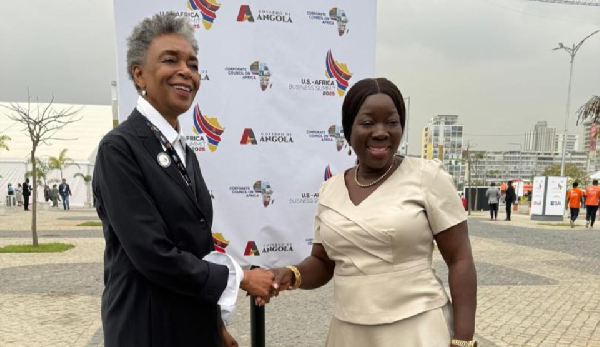By Prince Antwi
Ghana’s Minister of Trade, Agribusiness and Industry, Elizabeth Ofosu-Adjare, held high-level bilateral talks with Constance Hamilton, the Assistant U.S. Trade Representative for Africa, on June 25, 2025, during the U.S.-Africa Business Summit hosted by the Corporate Council on Africa in Luanda, Angola.
The meeting focused on key trade issues affecting Ghana, including the impact of recently imposed U.S. tariffs and the uncertain future of the African Growth and Opportunity Act (AGOA), which is set to expire on September 30, 2025.
In light of the 10% universal tariff imposed by the United States on a range of Ghanaian exports — such as cocoa derivatives, apparel, and other agro-based products — the Ghanaian government has been actively pursuing diplomatic and direct engagements to cushion the blow on local businesses.
Minister Ofosu-Adjare voiced strong concerns about the tariff’s negative implications for Ghana’s export-driven sectors, warning that it could significantly hamper economic growth. She called for targeted exemptions for developing economies like Ghana and advocated for constructive dialogue to protect Ghanaian exporters, particularly small and medium enterprises (SMEs), from adverse effects.
AGOA, which was enacted in 2000, has served as a cornerstone of U.S.-Africa trade relations, offering duty-free access to the U.S. market for thousands of African goods. Ofosu-Adjare emphasized the program’s transformative impact on Ghana’s textile and apparel industry. She cited the example of Dignity DTRT, one of West Africa’s largest apparel manufacturers, whose growth under AGOA has created jobs—especially for women and youth—and significantly contributed to Ghana’s industrial development.
With AGOA’s expiration date fast approaching, the Minister urged the U.S. to commit to a long-term extension of the agreement. She stressed that predictability and market access are critical for investors and exporters who rely on AGOA benefits to compete globally.
Reaffirming Ghana’s commitment to deepening trade relations with the United States, Ofosu-Adjare pledged to address concerns raised by the Office of the U.S. Trade Representative (USTR) and to promote a fair, sustainable, and mutually beneficial partnership.
In response, Hamilton acknowledged the importance of the bilateral engagement and emphasized the U.S. government’s current policy direction — prioritizing private sector-led investments in African sectors such as power, mining, and digital infrastructure. She highlighted a strategic shift from aid to trade-driven growth.
On AGOA, Hamilton noted that ongoing renewal discussions aim to build a more reciprocal trade relationship between the U.S. and African nations. She welcomed the dialogue with Ghana and expressed optimism that the broader U.S.-Africa engagement will pave the way for increased trade and investment.
Both parties concluded the meeting with a shared commitment to strengthening bilateral economic ties and fostering deeper collaboration between Ghana and the United States.
